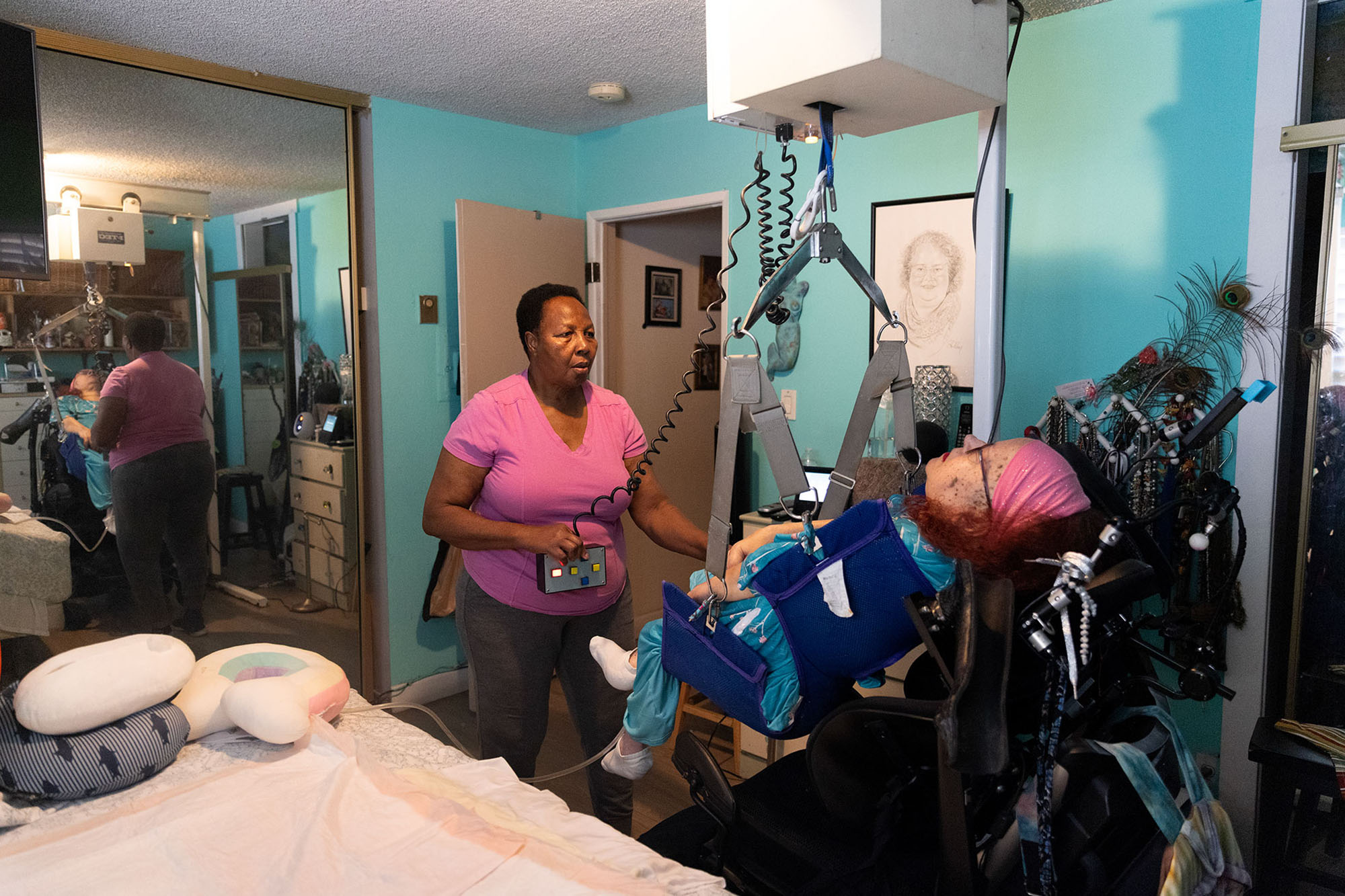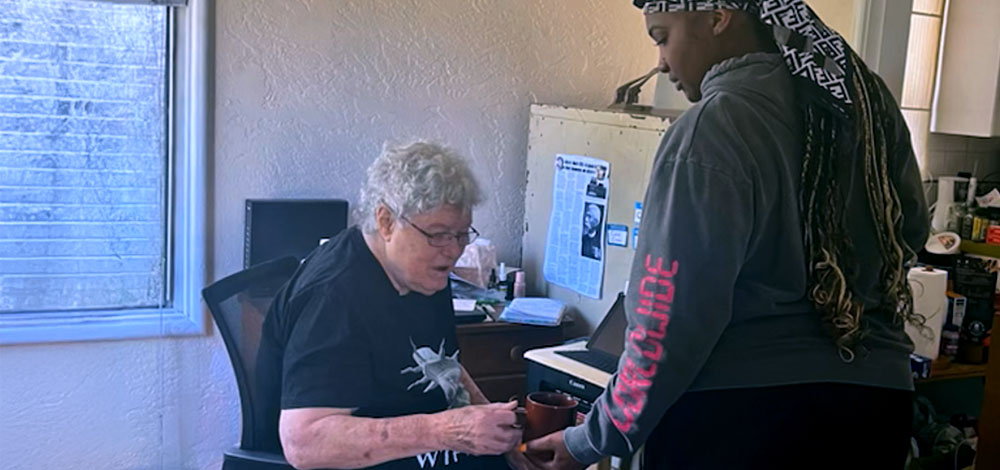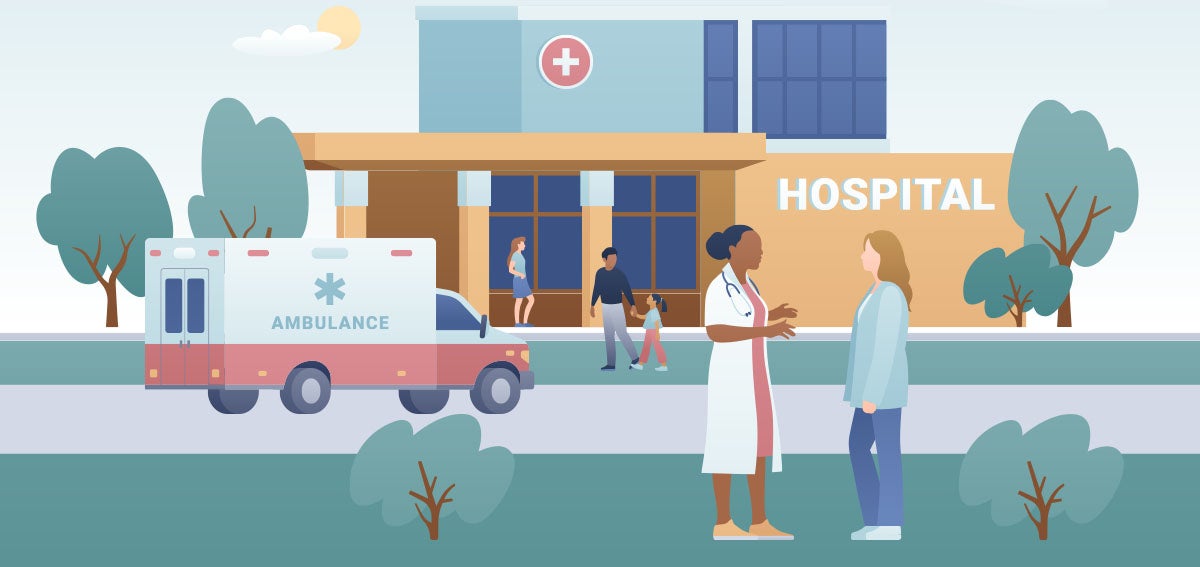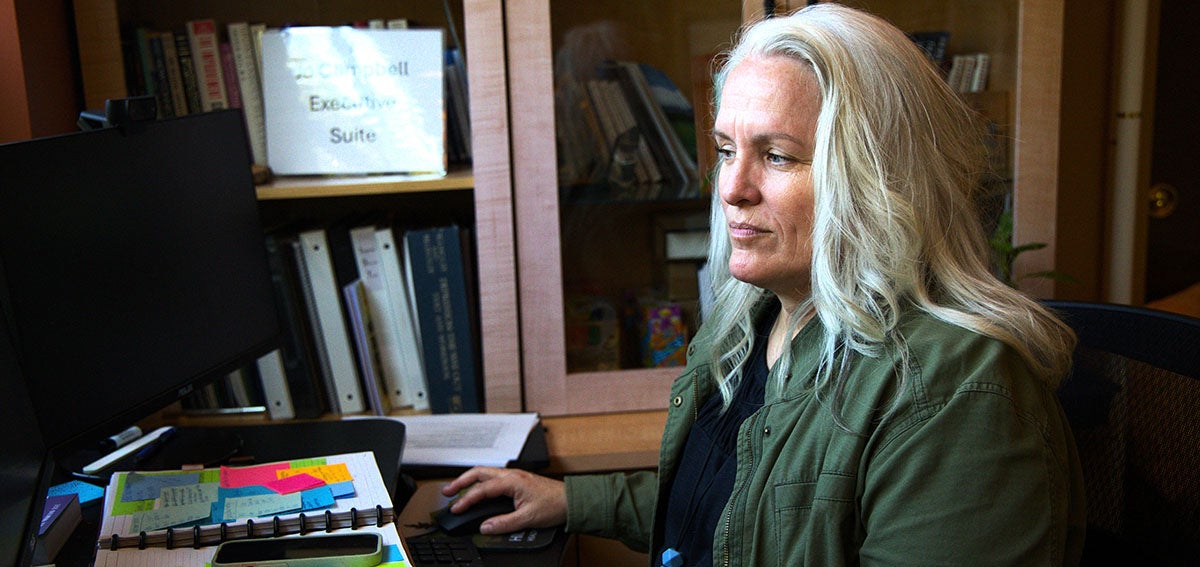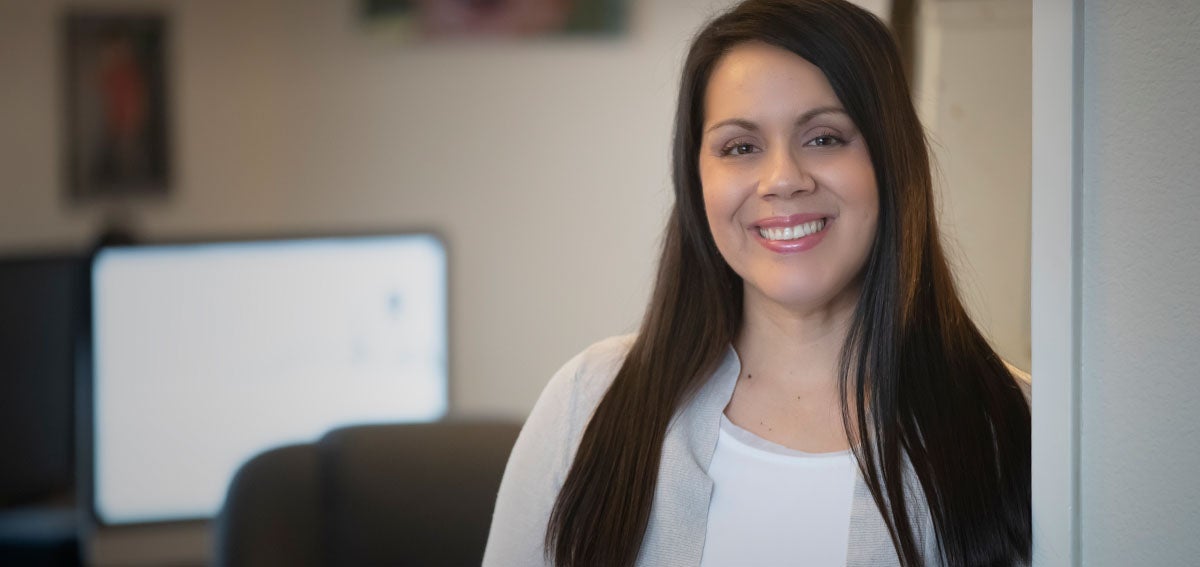
Lupita was six months pregnant with triplets when her water broke. The quiet 36-year-old farmworker suddenly had to leave her four children and enter Bakersfield Memorial Hospital for three months so doctors could watch over her during an unpredictable third trimester. She had recently separated from her husband, so her 17-year-old was tasked with taking care of his younger siblings until she returned from the hospital. This was before COVID-19.
At the hospital, Lupita (not her real name) was having a rough time in an unfamiliar environment, separated from family and unable to speak English. Enter Maria Torres, a Latina patient navigator employed by Docent Health, a technology-enabled care coordination company hired by health systems and plans to support patients. The hospital sends Torres to answer questions from Spanish-speaking pregnant patients like Lupita and connect them with community resources. Torres keeps in touch with clients via text messages and phone calls before and after childbirth — the stages when emerging problems can be caught before they result in sickness or death.
Docent Health recruits and trains navigators who reflect the demographic and cultural backgrounds of communities they serve to help patients learn to navigate a complex system of health and social services. In California, more than 70% of the patients Docent serves are Medi-Cal enrollees.
Docent is the latest company to receive a program-related investment from the CHCF Innovation Fund, which invests in market-based solutions aimed at improving access and health outcomes for Californians with low incomes. The fund’s portfolio includes nine active investments.
During Lupita’s hospital stay, Torres checked in with her almost daily, providing support and connecting her to resources, such as the social worker who helped Lupita apply for low-income housing and car seats for her babies.
“If there was ever a patient who needed that kind of help, it was Lupita,” Torres said.
Rewarding Work
Even after Lupita’s babies arrived, Torres stayed in regular contact while the triplets were in the neonatal intensive care unit and following up with her as she returned home. She was happy to find that mom and the triplets were doing well.
For Torres, it is rewarding work. Her devastating experience three years ago with a stillborn child of her own gives her a strong connection with her clients. “My favorite part of the job is knowing I was able to help a mom through her anxiety, or connect her with available services or resources, or just have a great conversation,” Torres said. “They’re so grateful for the call, for our outreach. I know I’m making a difference.”
Torres is one of many navigators employed by Docent. The Boston-based company has developed a community engagement platform that relies on texting to bridge gaps in health disparities and reduce costly and avoidable care outcomes like preterm births. The Docent technology integrates into the hospital electronic medical record system and allows Torres to see patient profiles and where they are at in their journey. Using integrated texting with live chat and automated messages, Torres collects personal data like preferences, race/ethnicity, and social determinants of health in multiple languages. The company, which operates in multiple states, helps patients and families navigate a range of medical conditions in addition to pregnancy, including surgery or mental health issues.
Torres frequently connects clients to food pantries, social workers, and rental assistance programs.
When it comes to connecting with patients on Medi-Cal, large hospital systems like CommonSpirit Health and Sacramento-based Sutter Health are logical customers for a company like Docent. Neither health plans nor outpatient providers are incentivized by Medi-Cal to invest in the kind of care coordination Docent provides. However, California hospitals are under more financial pressure to reduce lengthy hospital stays and prevent avoidable outcomes through better care coordination.
Inconsistencies and disparities in care for people of color sparked CommonSpirit’s interest in partnering with Docent, said Alisahah Cole, MD, a San Francisco–based family medicine physician and CommonSpirit’s vice president of innovation and policy for population health. “We did the pilot program because we saw a lot of disparities with women of color, especially Black women.”
Docent equips their navigators with a proprietary digital platform that helps them monitor, engage, and communicate with patients in a personalized manner, while being efficient enough to reach across large populations. They rely heavily on texting to ensure universal accessibility, since some patients with low incomes are unable to afford smartphones or expensive data plans, and patients like the texting program, said Cole. In addition to learning about local resources and their health system clients, Docent’s navigators are trained in federal privacy rules and state requirements for reducing implicit bias. California’s Dignity in Pregnancy and Childbirth Act, SB 464, requires hospitals and alternative birthing centers to implement implicit bias training programs for perinatal care providers.
Promising Results from Pilot Programs
CommonSpirit Health, a large nonprofit health system with 137 hospitals in 21 states, attends to more Medi-Cal births than all other health systems. The program at Bakersfield Memorial was part of a two-year pilot program that involved two California hospitals, Bakersfield Memorial and Marian Regional Medical Center in Santa Maria, and Chandler Regional Medical Center in Chandler, Arizona.
The Docent navigators and technology platform have produced promising results for parents and babies enrolled in Medi-Cal, said Royal Tuthill, Docent’s cofounder and CEO. According to internal data compiled by CommonSpirit, the program helped reduce neonatal ICU stays from 6.1 to 4.3 days, while hospital stays for patients who have recently given birth declined from 2.4 to 2.2 days. Within the population studied, a 37% reduction in preterm births was noted, he said.
Based on its effectiveness in commercial and safety-net populations, CommonSpirit has announced expansion of the Docent partnership to 60 hospitals in 11 states. That will bring the total in California to 10 hospitals.
The hospitals refer pregnant patients to the Docent service after a birth center tour or class, or when they get triaged in the obstetrics department. A navigator starts by texting an offer of help to the pregnant person. After the baby arrives, navigators follow up every two weeks.
Navigator support and resources are tailored to the individual and the community in which they live. Torres frequently connects clients to food pantries, social workers, and rental assistance programs.
There are clinical variances that happen when Black women come into the care setting. As health care providers, we have to acknowledge that and commit to eliminate those barriers.
—Alisahah Cole, MD, vice president of CommonSpirit Health
Navigators are also fielding a growing number of anxious questions from expectant parents during the COVID-19 pandemic. Can a family member attend the delivery? Are they allowed to bring baby clothes to the hospital? What should they pack for the hospital stay? Can they have home food delivered?
Torres works with about several hundred patients a month. First-time parents gravitate toward the Docent program because they desire reassurance, but Torres also works with people expecting a second or third child.
When working with underserved populations, Tuthill said, “our navigators help them develop trust and familiarity with the health systems.” As a father of four, he had very different experiences during each pregnancy, which made him realize that maternal health was a good place to close the gaps and inconsistencies in care that contribute to racial and ethnic health disparities.
Black Parents and Infants
The US maternal mortality rate, which reflects deaths related to pregnancy and childbirth, is the highest among the world’s industrialized nations — 17 maternal deaths per 100,000 live births. That is twice the rate in the next highest country, France. Within the US, the rate for the non-Hispanic Black community is three to four times greater than for Whites.
Society needs to recognize that disparities for Black parents and infants is not just about social determinants of health, Cole said. “Despite being a well-educated woman from a higher socioeconomic stratum, I have a four to seven times higher risk of dying in childbirth,” Cole said. “The uncomfortable conversation is that there are clinical variances that happen when Black women come into the care setting. As health care providers, we have to acknowledge that and commit to eliminate those barriers.”
Cole’s focus is on reducing disparities and increasing access through telehealth and outreach to the most vulnerable populations. Not all outreach is created equal. When information and engagement come from a person who shares a patient’s experiences and beliefs, it can be more effective.
As the program expands into more hospitals, that proactive approach Docent plans to extend to Native American tribes, rural residents, and undocumented people.
Cole expects care navigation will be used to improve outcomes in more clinical areas, such as oncology. “It’s a team-based model of care that’s so needed, especially as the complexities of health care continue to grow,” she said.
Before moving to California last year with her husband and two teenage children, she had worked in southern states with high rates of Black maternal and infant mortality. Cole appreciates the considerable work California has done to improve outcomes. She noted the state is ahead in some areas, but there is lots more to do.
“Navigating the health care system during my pregnancies was confusing, even for me as a physician,” Cole said. “As a woman of color, it was even more challenging to have certain conversations with my care team. Better navigation can lead to better outcomes, and ultimately that is what we all should be striving to achieve.”
Docent Health was acquired by GetWell Network in January 2021.
Authors & Contributors

Padma Nagappan
Padma Nagappan is a journalist who covers health, environment, and agriculture. Within the health beat, she focuses on public health issues, health impacts of environmental issues, medical advances, and medical research. She has reported on substance abuse and the opioid crisis, health disparities, cancer, mental health, and drug interactions. Her stories have been published in media outlets in the US and UK, including Everyday Health, Dermatology Times, US News & World Report, New Scientist, TakePart, MedShadow, Ag Alert, SugarOnline, San Diego Union-Tribune, and KPBS TV and Radio.
Padma earned a master’s degree in business administration from Madurai Kamaraj University in India.


